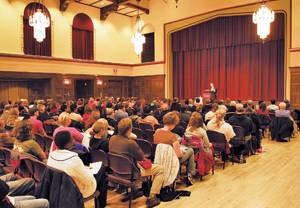Humanitarian urges to see others as equals

Dr. James Orbinsk,i humanitarian and author of An Imperfect Offering: Humanitarian Action for the 21st Century, speaks in to a large crowd in the Great Hall of the Memorial Union. Orbinski spoke at 8pm on Tuesday November 11, 2008. Photo:Molly McKernan/Iowa State Daily
November 11, 2008
James Orbinski has seen terrible tragedy, but still has hope.
In his speech, Orbinski, former president of Doctors Without Borders and Nobel Peace Prize winner, encouraged citizens everywhere to utilize their freedom to act in humanitarian efforts.
Orbinski spoke on global justice and human rights from the perspective of global health as well as his humanitarian efforts, which deal with medical issues in war and other social injustices, such as HIV/AIDS in Peru, Somalia, Afghanistan and Rwanda.
One after another, Orbinski shared stories of men, women and children who had experienced death, illness, genocide and political injustices from around the world.
He also spoke of the skepticism and antipathy that is sometimes directed toward “those who call themselves humanitarian.”
Using the war on terror as an example, Orbinski argued against the claim that torturing prisoners of war and abuse of persons of interest were humanitarian efforts due to their potential to save lives.
Orbinski said human dignity, equity and solidarity were the grounds for citizens should claim to create humanitarian change.
“I’m actually more hopeful today than I was 20 years ago when I started working as a humanitarian,” he said.
Orbinski defined humanitarianism and solidarity as the “direct and immediate actions that seek to relieve human suffering.”
“Humanitarianism is rooted in the experience of solidarity,” Orbinski said.
He said that many see the suffering of others around them as separate from themselves, when they should look at others as equals. The major problem of inequity and inequality was what caused a lack of health care in many countries.
“However, when one sees the other as equal in worth and dignity the compassion leads not to pity, but to solidarity that works with people to relieve the suffering,” he said. “It is the solidarity that refuses to accept the unacceptable and that is a call to take human suffering seriously.”
It is also important, Orbinski said, to stand up to demand political responsibility from leaders and governments during global injustices.
“I know intimately the imperfect struggle to bring ideas of equity to the pursuit of justice and human rights,” Orbinski said. “And yet I have never doubted the power of humanitarianism and the power of an engaged citizenship.”
Orbinski said the ultimate political failure was not intervening in local and global challenges. He said that to bear witness to the human rights problems around the world and to act was the duty of citizens.
“Citizenship … Is defined by exercise of liberty based on those rights… in relationship to others that at some level must engage public debate and implicitly demands good government,” he said.






